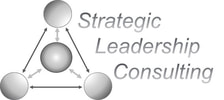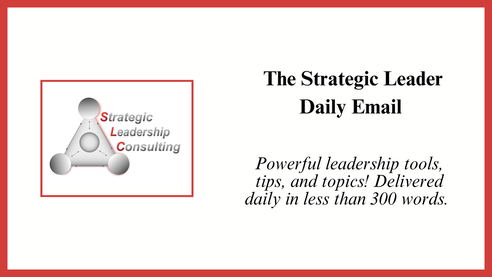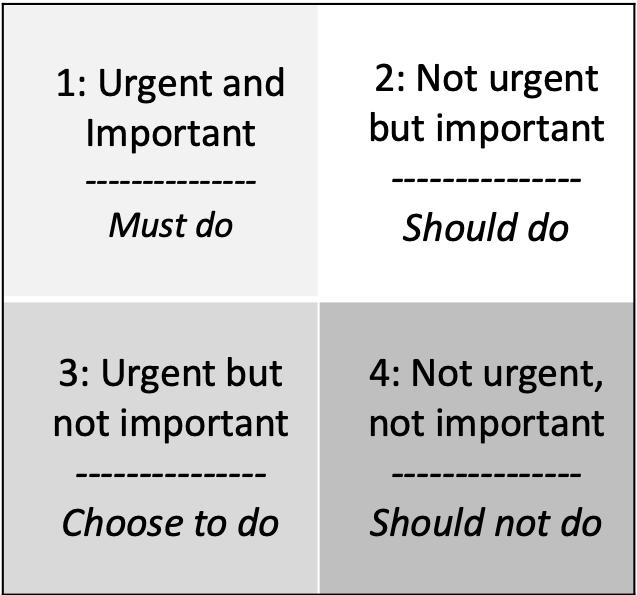|
Colleagues,
Urgent work drives us, but we have to drive the important work. The result is that urgent work often gets done before important work. What can we do about this?
In a nutshell, be intentional about focusing on the important and build in time to do it. I use one other strategy that really helps me on days that I am not at my best. I decide what an MVP day looks like. If I only get three things done, what three things would constitute a win? One of those things must be from quadrant 2. As I’m gearing down and taking some time to recharge, I’m planning on a number of MVP days over the next couple of weeks. Here are a couple examples of what they may look like. Example 1:
Example 2:
What might your MVP day look like? Do good and be well, Frederick
0 Comments
Colleagues,
We’ve been focused on understanding the role of leverage principles in both delaying and rebooting my efforts to complete a book. Today, let’s look at some lessons learned. A-B Break big projects into chunks or even make the total project less ambitious. You can do both by creating modular sections that are valuable alone or can be strung together. My example was breaking one book into two. 0>1 The sooner we can use something, the more valuable it becomes. Be clear about why you are doing your big change project. What problem are you trying to solve? Identify different aspects or symptoms of each problem and design your changes to affect those aspects so that situations improve throughout implementation. If you are moving all your meetings to Zoom, think about how to improve meetings in general and fold those improvements into Zoom implementation. MVP Piggyback projects on top of each other. Implementing new software? Try and use it as a way to improve practices that relied on the old software. Do you have a grand plan for developing a robust annual review process? You don’t need to invent new infrastructure, just repurpose what you have. Incorporate elements into things that you already do like quarterly meetings or weekly communications. M=V/E Smaller (A-B) and simpler (MVP) decreases effort. Sooner (0>1) increases value. If you aren’t feeling motivated, how can you adapt the project to have an immediate impact? If you attend to A-B, 0>1, and MVP and aren’t motivated, maybe it isn’t the right project? I hope this week has been helpful in getting you to think about applying leverage to your big projects, whether they are professional or personal. Do good and be well, Frederick Colleagues,
We’ve been dissecting the decision to put my book on pause instead write a daily email. Yesterday I made the case that based on the principles of leverage it was the right decision. However, based on the principles of leverage, wouldn’t it always be better to write something small and never finish the book? That’s not a wise choice, so today I will apply leverage principles specifically to writing the book. A-B I’m going to make the book shorter! The current outline includes four parts, but I am going to do only parts one and two for this book. I can do three and four for a second volume. 0>1 A couple of weeks ago my initial 7-week daily schedule ended. It followed the book outline, so if I pick up where I left off, I can immediately generate more writing for the book and keep up with the daily email. MVP By continuing to use the book outline for the daily emails, part of my plan is very simple. However, I still need to create space to edit, which includes adapting the 300-word emails to work in the book. Since I write best in the morning, this means revising my morning routine, which is currently in shambles. That will be the most challenging piece. M=V/E The book is a foundational piece of my business plan. However, it doesn’t directly impact some of the pressing issues I have, so the value part of the equation doesn’t feel great. The effort side of things isn’t too bad, assuming I can rebuild a good morning routine. Tomorrow we’ll look at applying the principles of leverage to your big project. Do good and be well, Frederick Colleagues,
The target date for finishing my book by June 22 has passed. Yesterday we discussed how the daily email went from quadrant 2 to quadrant 1 as I wanted to do something to support leaders in response to COVID. But why? Wouldn’t sharing the finished book with people also have been just as valuable? According to the principles of leverage, no, a book would not have been as valuable. Here was my thinking: A-B Recall that I had 10,000 words completed when I abandoned the book in March. With a goal of 24,000 total words, I was still 14,000 short. In contrast, my daily emails are 300 words, so it is a much easier load. 0>1 This was huge. I could start daily emails immediately so there would be an immediate impact. I reasoned that people didn’t need a boost in three months, they needed one today, tomorrow, and the day after. A daily email could meet that need. MVP (minimally viable product) I already had the infrastructure for the weekly email and moving to daily didn’t require any significant changes. I also decided to rely on book content for the emails, so I was able to create a daily topic schedule for seven weeks in less than an hour. M=V/E A daily email would provide value to others which made it valuable to me. The daily email was part of my long-range business plan, so the thought of being ahead of schedule on my plan also added value. With a topic list for seven weeks, writing 300 words a day sounded like a piece of cake. Tomorrow we’ll reflect on my decision and the results and on Friday we’ll look at lessons that you can apply to your own projects. Do good and be well, Frederick Colleagues, Yesterday I shared my goal of having my book completed by June 22 and suggested that the explanation for failure came in the form of the Eisenhower Matrix and the principles of leverage.
acknowledge that there are degrees of importance. So, what happens when a very important quadrant 2 task competes with a moderately important quadrant 1 task?
I had been making steady progress on the book, but in January I realized that it needed to be restructured. This actually increased my momentum and by the end of February I had rewritten 10,000 words, which meant I was almost hallway done.I was on the road the first two weeks of March and then took a week off to hike the Foothills Trail with Pam. Then came COVID. I wanted to do something to support people during this trying time, so I moved from a weekly l to a daily email. A daily email always part of my plan, but it was supposed to come after the book. It was important, but not as important as the book. However, with COVID, the daily email moved from quadrant 2 to quadrant 1 by becoming urgent, so the book got left behind. But why the shift? Why did I respond to COVID by shifting my writing focus? The answer lies in the principles of leverage, which we will look at tomorrow. Do good and be well, Frederick |
Categories
All
Archives
July 2024
|



 RSS Feed
RSS Feed